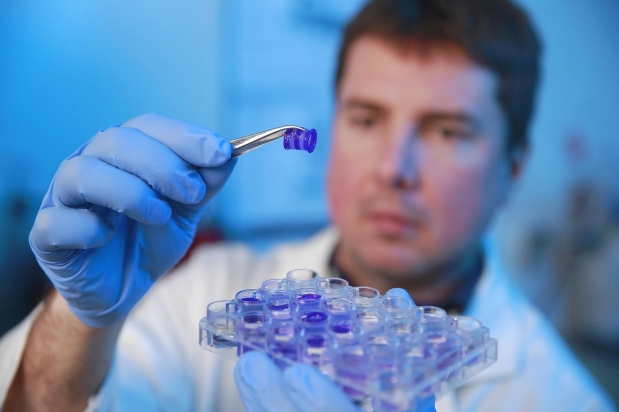READ MORE: e@UBC spins ideas of researchers and students into real-world.
Konrad Walus’s business sounds almost too futuristic — three-dimensional printing of human tissues for use in research or therapeutics.
Since last fall, however, Walus and his partners have run Aspect Biosystems Ltd. through the Entrepreneurship at UBC program, taking an idea from their research labs to incorporation, formation of a viable business plan and on to discussions with a potential first customer.
“Aspect Biosystems could not have started in a garage,” Walus said. The scientists behind it needed the testing equipment and imaging machines that go along with the infrastructure of a major research university like the University of B.C.
And, with a new focus on innovation, UBC has a strong interest in spinning the ideas of its researchers and students (Walus is an associate professor in UBC’s electrical and engineering department) out into real-world applications.
This is where Entrepreneurship at UBC, which uses the hip acronym e@UBC, comes in.
e@UBC and $550-million worth of ideas
“The whole goal is to get all of this knowledge, both with individuals and with science, out to build great companies in B.C. and out to change the world,” said Andy Talbot, e@UBC’s executive director.
UBC revamped and relaunched the two-year-old program in September, capitalizing on a $200,000 injection from the B.C. Innovation Council that is being used to support e@UBC’s mentorship program.
The process starts with a meeting where the student or researcher with the idea and staff at e@UBC figure out what they need.
Talbot said if the proponent just needs a bit of one-one-one coaching to help with an idea, e@UBC will match them with a mentor. If the idea is still “just for fun,” their staff might direct them to one of the regular workshops or “start-up weekend” events that the program regularly hosts.
“If they have an idea that’s useful for an accelerator program, we put them into an accelerator program” and on the path to creating a new company, Talbot said.
And with some $550 million worth of research going on at UBC in a given year, Talbot said, the university has a lot of raw material to work with to form new companies.
“Our goal is that there is another Google, there is another Apple out there and they’re coming from the scientists and technology (at UBC),” he added.
Enter the accelerator
Talbot said 100 ideas — brought in by individuals or groups — have entered the e@UBC process since it re-launch in September, and so far 10 have made it through the accelerator, a sort of entrepreneurial boot-camp, to incorporate as a new company. Aspect Biosystems is one of them.
“It’s an eight-week program where we try to get people from an idea to a validated business model,” he said.
Primarily, that means getting researchers out of their labs and into the market to meet as many potential customers as possible.
Validation of a business plan determines that “yes, someone cares about (the idea) and would buy it. Then we can form a company from that,” Talbot said.
Walus credits the accelerator with steering Aspect away from the wrong direction and putting them on a more viable path.
“When we thought about commercializing, we thought about making a (3D) printing system, adding a whole bunch of features to it and hoping someone would buy it,” Walus said. “The program changed our thinking about it.”
Aspect Biosystems’ process is to engineer biological tissues that mimic human cellular structures, and print them out using 3D printing technology.
In going to potential buyers to ask them what they wanted, Walus said they “worked from the customer back to the technology,” rather than the other way around. “That’s been extremely valuable.”
Beyond boot camp
After completing the boot camp, Walus said, Aspect’s founders have continued using mentoring from Talbot to nurture their business.
Once a business is off the ground, UBC’s Industry Liaison Office can step in to help if it needs to acquire intellectual property rights, or e@UBC can find them space and support services.
The organization even has benefactors who can invest seed funding, $150,000 to $200,000, which a new business can leverage to earn grant funding or to attract other angel investors.
The reality
Walus said the initial application for Aspect’s technology will be in drug discovery, creating computer-programmed human tissues that are better models for testing new therapeutics than traditional early testing methods.
“It’s quite possible, stemming from this, there will be whole classes of new therapeutics,” he added, noting that they are in late-stage discussions with their first customer, a big pharmaceutical firm.
Down the road, Walus said, the goal is to create tissues that could be used as patches in wound healing. Eventually, the technology could be used to print organs for transplant, but Walus said there are a lot of challenges between now and then.
“It’s a 15-20 year vision before we’d have, let’s say, ‘off the shelf organs,’” he said.



